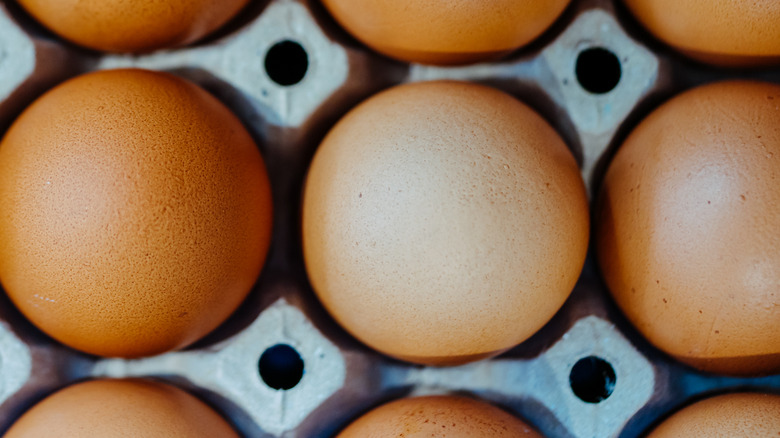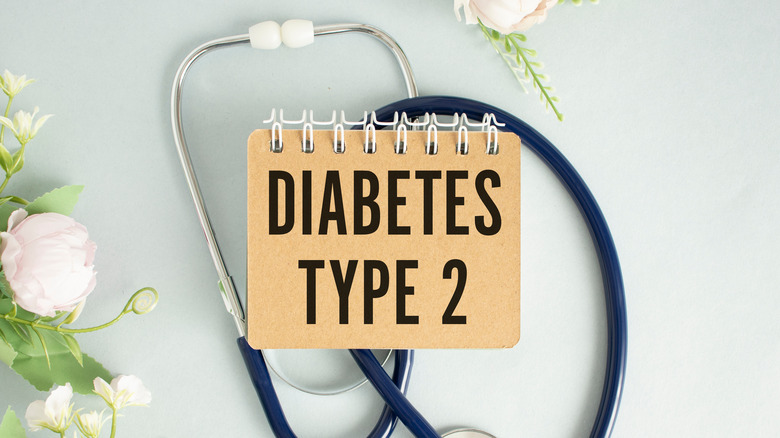This Is What Happens When You Stop Eating Eggs
Eggs are often classified as a superfood. They contain various vitamins, including folate, plus phosphorus, selenium, calcium, and zinc, among other minerals, which make them a healthy part of a diet (via NutritionData). Besides, eggs are easy to cook and can be consumed in different forms and recipes, making them a popular choice for people worldwide.
There are several health benefits of eating eggs, and NutritionData notes that the fact that they are rich in protein makes them too good to miss out on, sans dietary preferences. Protein is beneficial for blood pressure, which could make them a popular choice for people struggling with that health concern (via NIH).
Eggs are also rich in fatty acids, which are known to reduce the risks of heart diseases by lowering triglycerides levels in the blood (via NCBI). The study also suggests that consuming eggs for breakfast can aid weight loss by providing maximum energy in minimum calories and maintaining energy balance, per the National Library of Medicine.
Eating eggs has several health benefits, so much so that it becomes convenient to depend on them for proteins and other nutrients. However, concerns remain around the impact of an egg-rich diet on cholesterol levels, and their relation with type 2 diabetes.
Understanding the role of eggs on our body's cholesterol levels
A large egg weighing 50 grams has over 186 mg of cholesterol — around 62% of the recommended daily intake (via NutritionData). Now that's a bit — considering how people can easily eat three or more eggs a day. So wouldn't that mean that consuming eggs poses a threat to the cholesterol balance in the body?
Studies have shown the impact of eggs on our cholesterol level, revealing that the "good" cholesterol increased in people who ate 1-3 whole eggs daily. In contrast, "bad" LDL cholesterol remained unaffected in 70% of people. As for the remaining 30% of people — known as hyper-responders — the level of 'bad" cholesterols did go up a bit. However, it wasn't a cause of concern, as eating eggs also increases the size of "bad" LDL particles, and people with larger LDL particles have a low risk for developing heart disease (via Healthline). The results made it clear that eating three whole eggs a day is not a cause of worry for healthy people.
But what about type 2 diabetes?
Another concern is the effect of an egg-rich diet in people with type 2 diabetes, aside from the cholesterol issue. While studies have shown that egg consumption can contribute to atherosclerosis (via NIH), it's also been found out that people with type 2 diabetes might have an increased risk for heart disease after egg consumption (via NIH).
But again, it's not such a significant threat, as one study of people with type 2 diabetes concluded that eating two eggs per day (for six days in a week) for three months did not impact the blood lipid levels of cholesterol (via NIH).
Besides, a lot of the health effects also depend on other parts of our diet. For example, a low-carb diet — considered best for diabetic individuals — when combined with eggs, did not increase risk factors leading to heart diseases (via NIH).
It's clear that controlled egg consumption does not negatively impact people's cardiovascular health, and neither does it harm people with type 2 diabetes. This rules out the thought of stopping egg consumption due to these factors. However, if you are thinking of letting go of eggs due to specific dietary preferences or allergies (for which eggs are notoriously famous), read on to know what would happen if you stop eating eggs.
Stopping egg consumption might challenge your nutrition profile
If you depend on eggs — and not plant proteins — a little too much for your nutrition, you might have to find a way to supplement their benefits with something else if you quit eggs. And things can get worse if you have developed a taste for them and nothing else seems to please your taste buds.
Scared? Fear not, for the road ahead's a progressive one. The significant rise in veganism in the U.S. shown in an Ipsos study only shows that alternative nutrition items can work as good substitutes. For people with vegan dietary preferences or anyone who just wants to stop eating eggs, the alternative lies in food items such as tofu, soy, and others (via Healthline). Expanding the range of your diet could work.
Besides, many vegan recipes are gaining popularity with the continuous awareness around this food culture, which makes the journey towards quitting eggs not so hard, and delicious, and a lot of these dishes are easy to make with widely available ingredients.




